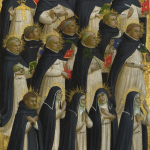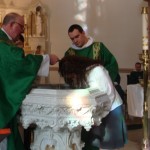
At the Easter Vigil Mass last night, the candidates for confirmation made the following profession of faith:
I believe and profess all that the holy Catholic Church believes, teaches, and proclaims to be revealed by God.
Which is admirably concise, but left me more curious about commas than the Second Amendement. Are they saying they believe that [all that the holy Catholic Church believes, teaches, and proclaims] is [revealed by God]. Or are they simply stating that they believe and profess all things that [the holy Catholic Church believes, teaches, and proclaims] states are [revealed by God]. Let me unpack the distinction, so you all can tell me if it exists.
It seems like the Church has some precepts that are foundational (Jesus is the Son of God, the two greatest commandments are “Lord your God with all your heart and with all your soul and with all your mind and with all your strength.” and “Love your neighbor as yourself”, etc). Then it has another set of propositions which are about the applications and implications of these core beliefs. Since I’m a math nerd, I might label them axioms and theorems. Axioms must be accepted as true; they’re what gives structure to the entire system. Theorems can be logically derived from axioms, but it’s possible for someone to be mistaken about whether a theorem is true, so the proofs need to be carefully examined.
The great commandment (or axiom) alone doesn’t tell us how to fulfil it; we need other data in order to learn how to follow it. For example, Catholics may all assent to Just War theory, and still disagree about whether a particular war makes the cut. They all share the axiom, but they are generating different theorems when they try to apply the core belief.
I just recently finished reading Peter Brown’s The Body and Society: Men, Women, and Sexual Renunciation in Early Christianity and one of the biggest things I took away is that Christian thinkers have managed to derive a lot of contradictory theorems about proper sexual conduct from some of the shared axioms about respect for human persons. In the book, Brown cites St. Jerome as teaching that the blood of martyrdom might be sufficient to wipe out the shame of marriage, but better not to marry at all. This kind of opinion was common enough that St. Augustine wrote a letter to a group of nuns to urge them not to view married women as hopelessly compromised.
Jerome’s vehemence and the widespread desire to be eunuchs for the Kingdom that Brown catalogues in the early church bear little resemblance to the marriage-mindedness of the contemporary Catholic Church. I assume there have been no new axioms in the intervening centuries, but the theorems the church has derived have changed. (And reading Augustine’s Confessions, I ran across another theorem-level change: the Church no longer endorses the idea that people should delay baptism because their sins after baptism will be judged more harshly).
So where does that leave a Catholic who agrees with the axioms but thinks certain theorems are wrongly derived or just feels agnostic about some of the stated implications. I could certainly imagine this coming up with regard to the Church’s view on homosexuality, where the data available to us have changed pretty dramatically in the last fifty years. Could such a doubting Catholic honestly make the profession of faith that Confirmation demands?















